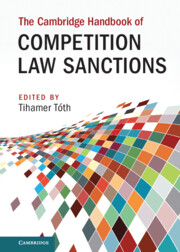Book contents
- The Cambridge Handbook of Competition Law Sanctions
- The Cambridge Handbook of Competition Law Sanctions
- Copyright page
- Contents
- Authors’ Affiliations
- Acknowledgment
- Part I General Chapters
- 1 The Quest to Create an Effective Set of Competition Law Sanctions
- 2 The Role of Fines in the Toolkit of Competition Agencies
- 3 Sanctions on Legal Persons
- 4 The Effectiveness of European Antitrust Fines
- 5 Corporate Governance and Competition Law Sanctions
- 6 Antitrust Criminalization As a Legitimate Deterrent
- 7 Criminalization of Anticompetitive Conducts
- 8 “Consensus”-Based Sanctions and Commitments
- 9 Effectiveness of Commitment Decisions
- 10 Compliance Policies and Sanctions
- 11 The Role of Administrative Courts in the Effective Enforcement of Competition Law Sanctions
- 12 Civil Sanctions in Antitrust Public Enforcement
- 13 What Role for Private Enforcement in EU Competition Law?
- 14 The Insights of Labor Law
- 15 Human Rights Jurisprudence and the Effectiveness of Competition Law Sanction
- 16 Catholic Teaching on Just Punishment, Especially in Connection with Financial Matters: According to the 1983 Code of Canon Law
- Part II Country Reports
- References
12 - Civil Sanctions in Antitrust Public Enforcement
from Part I - General Chapters
Published online by Cambridge University Press: 29 July 2022
- The Cambridge Handbook of Competition Law Sanctions
- The Cambridge Handbook of Competition Law Sanctions
- Copyright page
- Contents
- Authors’ Affiliations
- Acknowledgment
- Part I General Chapters
- 1 The Quest to Create an Effective Set of Competition Law Sanctions
- 2 The Role of Fines in the Toolkit of Competition Agencies
- 3 Sanctions on Legal Persons
- 4 The Effectiveness of European Antitrust Fines
- 5 Corporate Governance and Competition Law Sanctions
- 6 Antitrust Criminalization As a Legitimate Deterrent
- 7 Criminalization of Anticompetitive Conducts
- 8 “Consensus”-Based Sanctions and Commitments
- 9 Effectiveness of Commitment Decisions
- 10 Compliance Policies and Sanctions
- 11 The Role of Administrative Courts in the Effective Enforcement of Competition Law Sanctions
- 12 Civil Sanctions in Antitrust Public Enforcement
- 13 What Role for Private Enforcement in EU Competition Law?
- 14 The Insights of Labor Law
- 15 Human Rights Jurisprudence and the Effectiveness of Competition Law Sanction
- 16 Catholic Teaching on Just Punishment, Especially in Connection with Financial Matters: According to the 1983 Code of Canon Law
- Part II Country Reports
- References
Summary
The chapter discusses the structure of public enforcement in the US antitrust system, with particular emphasis on the use of civil sanctions in public enforcement of laws governing marketplace competition, and a focus on civil sanctions under the Sherman Act, FTC Act, and parallel state law in the United States. It then argues that the use of civil sanctions in public enforcement is inextricable from the supporting remedial structure, including criminal enforcement and meaningful private enforcement. The chapter explains the theory of civil fines in law enforcement and reasons for a jurisdiction’s choosing one or the other form of sanctions. It then explains the structure of remedies for antitrust violations in the US system, highlighting the three forms of public enforcement and the backstop of private enforcement. It then turns to recent developments in civil remedies, including punitive fines as well as damages and related civil monetary relief. It criticizes the Third Circuit Court of Appeals decision in Abbvie Inc. and interrogates the current Supreme Court case involving AMG Capital, inquiring whether AMG Capital might influence the interpretation of the FTC Act as it applies to competition law enforcement as well as consumer protection enforcement.
- Type
- Chapter
- Information
- The Cambridge Handbook of Competition Law Sanctions , pp. 205 - 217Publisher: Cambridge University PressPrint publication year: 2022
References
- 1
- Cited by

